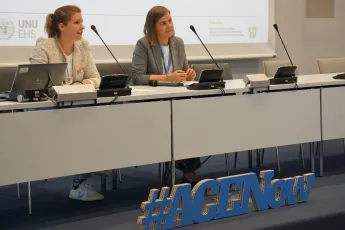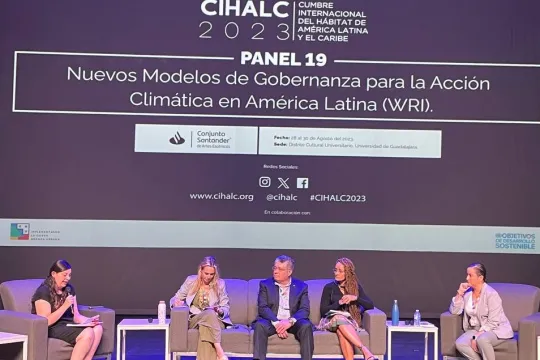
ACE workshop © Arianna Flores Corral / UNU-EHS
As the effects and impacts of climate change intensify, it becomes increasingly important to consider the legacy we are leaving behind for future generations. Today, the world is home to 1.8 billion young people aged 10 to 24 — the largest generation of youth in history. To visualize, the number of young people is larger than the populations of China and the USA combined. This generation is acutely aware of the challenges and risks posed by the climate crisis and youth have already become important advocators for climate action and justice. Aiming at enhancing youth advocacy skills and coalition-building competencies and inspired by the Transformative Urban Coalitions process and insights, on June 5th and 7th, UNU-EHS and UN Climate Change hosted a capacity-building workshop with 46 participants from all around the world.
All coming from a background of climate activism, the attendees had the opportunity to enhance their advocacy skills and coalition-building competencies while advocating for climate action at a local and subnational level to global audiences. UN experts on capacity development for urban transformations and climate communications professionals led the in-person training using a learning-by-doing approach. It moved participants' shared needs to co-creating calls to action to advocate for solutions. Based on their most pressing challenges, participants worked together in five groups, addressing the shared needs to act on: perceived lack of power (ants), frustration with delayed action (cheetahs), disappointment of not seeing progress (woodpeckers), feeling of not being on the same page regarding what needs to be done (whales) and struggle to access funding (bees).

Participants went through a continuous learning-by-doing journey, which included ten tools and a hackathon style dynamic:
- ABT narrative: refining a story/message in a basic 3-part structure that includes the needs’ set up (and), a contradiction (but), and a consequence (therefore).
- Framing challenges as storytelling narratives: exploring the central role of narrative and storytelling in the human experience, examining this particular message format and its unique ability to outperform other formats as a method of engagement, a platform for learning, a coordination technology and a tool for change.
- AIM Framework: identifying the A - target audience, I – Intention of advocacy and M - message. This model identifies the essential elements to create better-structured narratives.
- Actor mapping: recognizing your influence mapping networks to connect and encourage exchange and networking with youth among local and international stakeholders.
- 6-handshakes rule (six degrees of separation): identifying potential target audiences and how to get to them in less than “six handshakes”.
- Talkshow: publicly speaking about your challenges and outcomes, representing a group.
- Transformative communications masterclass: The session aimed at the participants' understanding of who they are talking to, why it matters, how to present issues that truly resonate with others, and how storytelling can serve as a “superpower” for doing just that.
- Transformative Coalitions simulation: Speed-up activity, creating collaboration among a diverse group of actors, providing a neutral space for exchanging views, experimenting and joint learning about how to share a specific concern under uncertainty and urgent action requests.
- Elevator pitch: effectively scripting and delivering your message in 40 seconds, including explaining your needs, summarizing the evidence, introducing your coalition and giving a call to action.
- Meaningful feedback: receiving relevant and constructive feedback as a key to constant improvement and recognition of teamwork efforts.
After two intense days of working together, all workshop participants shared feedback and discussed how to apply these tools in their local contexts and replicate the knowledge gained. Among their reflections, they emphasized the importance of communication and coalitions as tools for advancing climate action and bringing more people up to the task, regardless of their age or position. The group expressed that, no matter how small, slow, stubborn, misunderstood or resourceless one might feel, there is always a path forward when coming together to solve a problem! For UNU-EHS, hosting this workshop served to test this content and methodology in an in-person format. As next steps, UNU-EHS will be taking the feedback received into consideration to improve this capacity development approach for sharing the expertise on transformative communications and coalition-building with other global audiences next November at COP29 in Baku, Azerbaijan.
